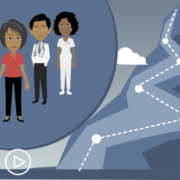How Can You Thrive With AML? Advice for Navigating Care.
How Can You Thrive With AML? Advice for Navigating Care. from Patient Empowerment Network on Vimeo.
How can you thrive with AML? In this animated explainer video, an AML specialist and patient discuss how to make informed decisions about your care and live a full life with AML.
Related Resources:

|

|

|
Transcript:
Raquel:
Hi, I’m Raquel. Nice to meet you! I am living with acute myeloid leukemia, or AML. When I was first diagnosed, my husband and I were very overwhelmed by a cancer diagnosis. But once I found the right care team and learned more about my disease and treatment options, I’ve been living a full life.
Meet, Dr. Shaw – my doctor.
Dr. Shaw:
Hi! I’m Dr. Shaw, and I’m a hematologist specializing in the care of people with AML.
AML is a cancer of the blood and bone marrow, and it is the most common acute leukemia in adults in the United States. Because this is an acute leukemia, it progresses quickly and should be treated immediately.
There are typically two phases of therapy:
- Induction therapy is the first line of treatment and is meant to induce remission.
- The second phase is consolidation therapy which is meant to maintain the remission.
As Raquel mentioned, with the right team and care plan, it is possible to live a full life and to thrive with AML.
Raquel:
It’s so true. Navigating my care has been much easier, because I partner with my healthcare team – it makes me feel involved and confident in decisions.
Dr. Shaw:
That’s right, Raquel. When considering treatment, it’s important to weigh all of your options.
While your healthcare team is the expert when it comes to the clinical side of your disease, you, as the patient, are the expert on how treatment will impact YOU and your lifestyle.
Raquel:
And as someone who knows my needs well, my husband is another key member of my team. He comes with me to appointments and takes notes during visits, and when it is time to make decisions about my care, we both feel well-informed about the options.
So, Dr. Shaw – what factors should be considered when choosing an AML treatment?
Dr. Shaw:
Well, it’s important to note that everyone’s AML is different, so what may work for one person may not work for another. In general, we consider certain factors, such as:
- The patient’s age and overall health.
- Any pre-existing health issues.
- Test results, including any mutational testing results.
- Finally, and most importantly, the patient’s treatment goals and preference.
Raquel:
And I like to make informed decisions. So, when considering therapy, I also did some research on my own, and then discussed the information with my healthcare team. It helped my husband and me understand what we’d learned, and confirmed our decision.
Dr. Shaw, what sort of questions should patients ask their doctor when considering a treatment plan?
Dr. Shaw:
Great question. When choosing therapy, patients should ask:
- How is the treatment administered, and how often will I need treatment?
- What are the potential side effects of the treatment?
- How will the effectiveness of the treatment be monitored?
- And, what are options if this treatment doesn’t work for me?
- Is there a clinical trial that might be right for me?
Raquel:
That’s great advice. Once you’ve begun treatment, it’s important to continue to share how you are feeling with your healthcare team – be sure to mention any side effects or symptoms you may be having.
Dr. Shaw:
That’s right, Raquel. If you speak up about what’s bothering you, we can usually find a way to manage the issue.
It’s also important point to tell your doctor if you’ve missed a dose of your medication. Many of the newer AML therapies are self-administered, and it’s important to let us know so we can adjust the plan if necessary.
So, Raquel, can you share advice for thriving with AML?
Raquel:
- First, understand and participate in treatment decisions. Be sure to educate yourself about AML and share your personal preferences when choosing therapy.
- Then, communicate regularly with your healthcare team – don’t wait to share information only when you have an appointment.
- And, utilize your whole team – nurses, nurse practitioners, and others, are all there to help you.
- Use your patient portal. You can view lab work and test results, or even use the messaging feature to communicate with your team.
- Bring a friend or loved one to appointments and always write down any questions or concerns in advance.
Dr. Shaw:
And, most importantly, remember you are at the center of your care. Advocate for yourself!
To learn more, visit powerfulpatients.org/AML to access a library of tools. Thanks for joining us!





![[ACT]IVATED RMC Resource Guide [ACT]IVATED RMC Resource Guide](https://powerfulpatients.org/wp-content/uploads/ACTIVATED-RMC-Resource-Guide-180x180.png)




